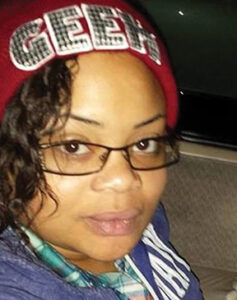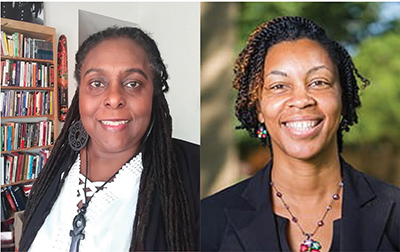
Atatiana Jefferson’s Murder Has Become the Norm, Psychologist Says Crutchfield
By Valerie Fields Hill
Texas Metro News
For some African American parents and professionals, the trial of former Fort Worth police officer Aaron Dean was too much – excessive news coverage, an outpouring of gory details and lengthy deliberations over sentencing.
So, they ignored the real-life drama played out this week in a Fort Worth courtroom: They refused to read online news accounts and skipped television coverage of the trial.
“I heard about it,” said Zyshonne Harris, 23, a Fort Worth high school teacher and graduate student. “But it’s like opening up wounds.”
Harris is among a score of Black professionals who said Tuesday that paying little attention to the sentencing of Dean, and for that matter, any other high-profile case involving the killing of African American citizens, is now common behavior amongst themselves and their peers. Such cases are too emotionally taxing to watch, they said.
“We all have that feeling that nothing is going to happen,” said Harris, who teaches commercial photography at an Uplift public charter school. “They’re just going to get a slap on the wrist.”
Tuesday, Tarrant County jurors handed Dean, who had worked just a few years as a police officer, a sentence of 11 years, 10 months, and 12 days for fatally shooting Atatiana Jefferson.
Jefferson, 28, was a recent college graduate who was saving money to go to medical school. Dean shot and killed her October 12, 2019, while she was in the bedroom of her Fort Worth home. Her then eight-year-old nephew was nearby.
Dean testified he feared for his life after responding to what he thought was a burglary call.
The shooting came less than a year after former Dallas police officer Amber Guyger, who is white, shot and killed Botham Jean, a 26-year-old Black accountant, in his Dallas apartment.
Guyger testified in her 2019 trial she mistook Jean’s apartment unit for her own – and that she thought he was an intruder. Guyger was convicted of murder and sentenced to 10 years in prison.
Both cases garnered national and international attention. The cases were among a years-long string of police and civilian killings of, with few exceptions, unarmed African American citizens who were involved in routine daily living activities.
Dean was charged with murder. He was convicted last week of manslaughter after jurors were allowed to consider convicting him of the lesser charge. The manslaughter conviction carried a maximum sentence of 20 years.
Harris, who is working on a master’s degree in film, said Dean’s sentence is disappointing – but not unexpected.
“Black women just don’t get justice,” he said. “Eleven years for killing someone in their own home? Make it make sense.”
Julius Jefferson, a husband, and father of two young daughters, was unaware late Tuesday that Dean’s sentence had been handed down, despite four major network news programs cutting into regular programming yesterday afternoon to broadcast the decision. He chose not to watch, he said.
In 2019, after the Fort Worth woman was killed, Jefferson did follow news accounts of the case, he said. “I told somebody the other day it really touched me because my last name is Jefferson.”
This week was different: Emotions were too high, Jefferson said. He had not watched a single broadcast. “We’re tired of turning the other cheek. The thing is, it was her home,” he said of Atatiana Jefferson, who is not related to him.
Therapists said Tuesday they were not surprised some local residents chose to avoid the barrage of media attention on the Dean trial and sentencing.
“It’s grieving,” said Pamela Hill, an adjunct professor in the School of Social Work at the University of Texas at Arlington.
“It’s that connection,” Dr. Hill said, adding that many Black parents, though unrelated, viewed Jefferson as their own family. “She could have been us. She could have been our daughter, our sister.”
Among details that emerged from the trial were that:
- Dean entered Jefferson’s home after shooting her, but did not render aid, though Jefferson lay on her bedroom floor, bleeding from the gunshot wound to her chest.
- Jefferson’s sister told news outlets that her nephew, who was home playing video games with Jefferson when she was shot, suffers trauma from his experience.
- Dean gave himself a grade of “B” when asked by prosecutors during his testimony to assess his own actions on the night he shot Jefferson.
Dr. Hill and Jandel Crutchfield, a licensed Social Worker, said such trial testimony may remind some African American parents of similar cases involving unjust killings of Black citizens and they may trigger traumatic responses.
For that reason, Dr. Hill, like Julius Jefferson and Harris, paid only cursory attention to this week’s sentencing.
“I never watched the trial. I’m the same way. I would see the highlights on the news. I have friends who were paying attention to it,” Hill said.
“All of (the trials) are the same. I have never watched trials like that because it’s too emotional.”
Dr. Crutchfield said the Dean trial and sentencing comes on the heels of an emotionally exhausting political season this fall which saw many Black Americans across the country involved in the Georgia gubernatorial and Senate races in which Stacey Abrams sought to become that state’s first Black female governor and the Rev. Raphael Warnock sought re-election in a highly contentious bid.
“Everybody was saying ‘We need Black people to turn out in Atlanta.’ All of this is consistent pressure,” Dr. Crutchfield said. “I feel like we’re trying to do so much on so many different fronts.”
As a result, she said, some Black professionals and parents are, understandably, “pulling back” emotionally so as to not allow themselves to expect greater results from highly charged trials with racial overtones.
“It’s coping,” she said. “With all of that baggage, people don’t want to relive the letdown of the Trayvon Martin (14-year-old killed by George Zimmerman in 10 years ago) case.”
